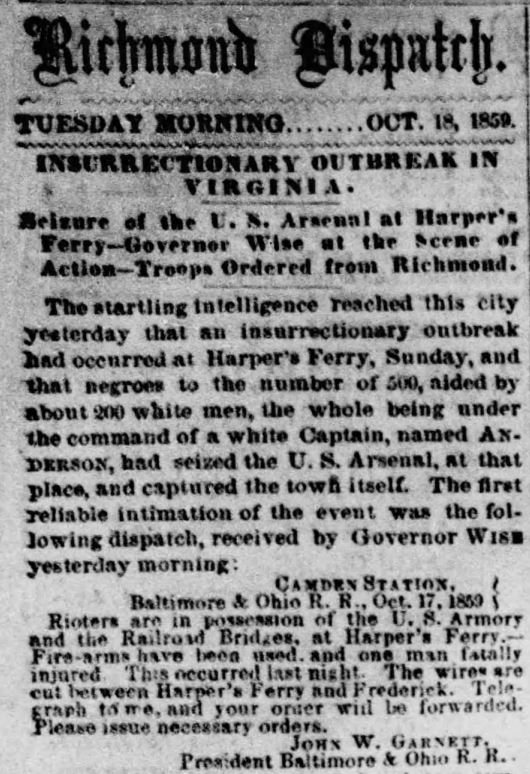… didn’t appear until October 18, 1859… two days after the raid was initiated.
For those who know the story, it’s also interesting to read the exaggerated numbers involved in the raid, and the reference to a “Captain Anderson” instead of John Brown.


Posted on October 16, 2016 by The Wild Pretanī
… didn’t appear until October 18, 1859… two days after the raid was initiated.
For those who know the story, it’s also interesting to read the exaggerated numbers involved in the raid, and the reference to a “Captain Anderson” instead of John Brown.


This site uses Akismet to reduce spam. Learn how your comment data is processed.

| Susann Clendening on Another form of Civil War… | |
| Kenny on On my supposed isolationist “h… | |
| Janet Poff on The graves of “Galvanize… | |
| Joseph B Thomas on A Virginia Southern Unionist,… | |
| Robert Moore on About Geotag blogging |
mib8
October 16, 2016
Impressions from grade-school: It sounded like they were talking about a raid on the ferry, but it was a raid on the arsenal. It was not clear (in grade-school) whether is was a private business or government operation, or a private business totally dependant on government contracts. If it was primarily motivated by opposition to slavery, why attack an arsenal? What’s the big deal? He had only a small gang, after all? Why do/did some people make such a fuss over such a minor thing?
Well, as I said, impressions from a grade-school student not living close by and not realizing he had ancestors who had been born in the close vicinity, though having read several accounts more recently, I must also confess continued difficulty in appreciating it as having such magnitude as some of the chroniclers give it.
jon Kasso
October 21, 2016
I believe it was a relatively small incident in and of itself (though not from the perspective of those involved). But so is the lighting of a match and that may or may not be a significant action depending on where you light it. It was certainly dramatic with the cutting of telegraph wires, a fire, and it was what today might be considered an act of terror in capturing the Second Federal Armory of the United States. I have a small 4 page letter written by a woman, Mary Maury, the day of the incident written from Needwood, WV (vicinity of Harpers Ferry) about the incident to her relatives in New York because the telegraph wires had been cut. She told them as an FYI that the truest account would be in the New York Tribune (this is from memory and I don’t have a copy of that paper). She also mentioned she was aware a Southern General was marching North with troops. (The General she indirectly refers to was Robert E. Lee). The Abolitionist controversy was a long festering issue between the North and South mired with Moral and Economic conflicts so it touched an emotional chord on all sides. It was a fight that was already about to begin and this served in retrospect to be something like the first shot fired in the worst war America has suffered. So it was significant in that respect. She mentioned something to the effect that the blacks she interviewed nearby did not seem so concerned with the cause of freeing slaves, and were or seemed happy. However in such a situation (time and place) I’m pretty sure a black person, slave or not, would not want to get caught up in this drama by saying anything inflammatory.